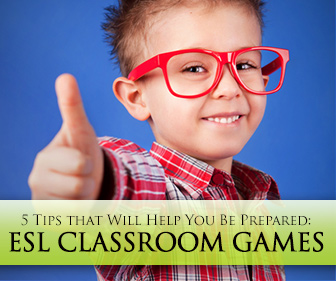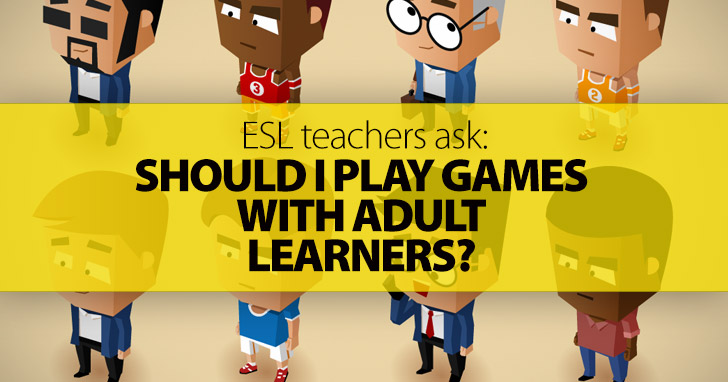Games in the ESL Classroom: 5 Tips that Will Help You Be Prepared


“I’ll be teaching adult learners after years of experience teaching only kids. Games were the backbone of my classes with young learners, so my main question is: should I play games with adult learners, too?” *
Most adult ESL learners are very serious about their studies. Some consider it an investment, a means of improvement and furthering their careers. Others desperately need to learn conversation skills because they’ve moved to an English-speaking country. None of these adults have time for games. Or so they think. There are plenty of people who think games in adult classes are a waste of time. But they couldn’t be more wrong. And here’s why:

How many times can you ask a student to “ask a classmate a question with ‘ever’” before they start dozing off? Games offer engaging opportunities to practice a verb tense, language point or set of words – again and again.
 Tip: Use any board game template and adapt it to suit the grammar or vocabulary you want to practice. Students may take turns asking questions or providing examples as they try to reach the finish line first. You can make the game as easy or as challenging as you like, and add special “rules” (if their questions/statements are not correct, they have to move back two spaces).
Tip: Use any board game template and adapt it to suit the grammar or vocabulary you want to practice. Students may take turns asking questions or providing examples as they try to reach the finish line first. You can make the game as easy or as challenging as you like, and add special “rules” (if their questions/statements are not correct, they have to move back two spaces).
Students walk in and take their seats, and you can tell from the look on their faces they’ve had a tough day at the office. Why make them “get down to business” right away? Help them unwind, instead, and get them into the right mood for class with a quick game.
 Tip: Draw a Tic Tac Toe grid on the board for a quick review of what they learned the previous class. Or use it to check homework answers.
Tip: Draw a Tic Tac Toe grid on the board for a quick review of what they learned the previous class. Or use it to check homework answers.
Adults can be just as competitive as little kids. If they’re trying to beat a classmate or another team, they will work harder to produce the right questions, word or phrase.
 Tip: Whiteboard games are particularly well-suited to adult learners, but choose a game that will be competitive and mentally stimulating, like Jeopardy. It has a “game show” feel to it that adult students can relate to.
Tip: Whiteboard games are particularly well-suited to adult learners, but choose a game that will be competitive and mentally stimulating, like Jeopardy. It has a “game show” feel to it that adult students can relate to.
When considering ways to make your lesson more engaging, I always say variety is key. And games are just another type of activity that you can add to the mix. If you, on the other hand, choose to not play any games, because you think your students are “all grown up”, you’ll find it harder to reach the right level of variety.
 Tip: As you look at your lesson plan, see how many of each type of activity you’ve planned. How many listening, writing and reading tasks have you planned? How many games? Is it possible to replace the drilling exercise with a game? Try to see where a game could fit into the lesson plan as a whole.
Tip: As you look at your lesson plan, see how many of each type of activity you’ve planned. How many listening, writing and reading tasks have you planned? How many games? Is it possible to replace the drilling exercise with a game? Try to see where a game could fit into the lesson plan as a whole.
Let’s be honest, here. Adults are often very opinionated. They have big ideas about what should and what should not happen in a classroom. Meanwhile, kids just go with the flow. Learning through games comes more naturally to them, but they’re also a lot more flexible. It’s a lot easier to shape a young mind, right? So, when we’re faced with grown ups who copy everything down, or look everything up in the dictionary, or ask questions about every little word they did not understand, the best we can do for them is take them out of their rigid structure. Shake things up! Adult learners who play games in class get to tap into another aspect of their personality, not the responsible, serious adult who has to have everything under control, but the person who can relax and simply enjoy the learning experience.
 Tip: Never assume that because it’s fun for kids (or even other adults), it’ll be fun for your particular class. Some adults won’t like games with charades or activities that involve running or a great deal of TPR. Adults should play games that are more mentally challenging and stimulating. Try to choose games that will help them think fast, something that always comes in handy as they try to improve conversation skills.
Tip: Never assume that because it’s fun for kids (or even other adults), it’ll be fun for your particular class. Some adults won’t like games with charades or activities that involve running or a great deal of TPR. Adults should play games that are more mentally challenging and stimulating. Try to choose games that will help them think fast, something that always comes in handy as they try to improve conversation skills.
And help your adult learners do the same. There are plenty of games you can play in class that will help them think, practice and succeed in improving their English. And when they use the skills you’ve taught in class, everyone’s a winner!
* This question was sent in from a real ESL teacher, just like you! If you need any advice on a particular topic, share your question in the comments below. Or tweet your question to @busyteacher_org with the hashtag #ESLTeachersAsk. Your question might get picked and featured in an article!